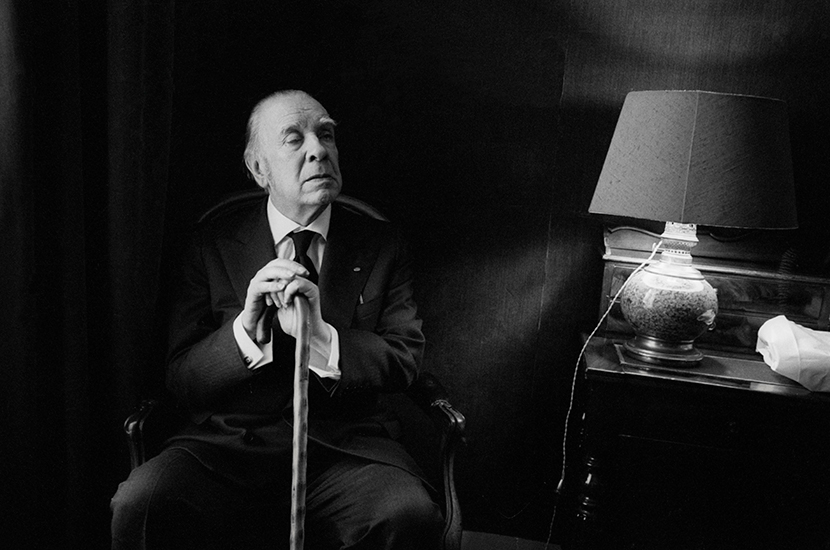‘The story that Jay Parini recounts in Borges and Me is untrue,’ a recent letter in the TLS claimed, ‘and it should be understood as fiction.’ The author, Maria Kodama, Borges’s widow and literary executor, has also told the press that she ‘will have to act in some way or other’ should the book come out in Argentina. Borges memoirs have long exceeded the master’s oeuvre by what must amount to the library of Babel in volume. The author of one classic of the genre, Norman Thomas di Giovanni, Borges’s translator and collaborator, told me a decade ago: ‘I’m not going to lie to you now and say, you know, we were so close Borges cried every time he saw me.’
Parini is the author of several books based, as they say, on true stories, including The Last Station, a novel about Tolstoy. His latest one is labelled as ‘novelistic memoir’ — hence the subtitle. The events described took place 50 years ago. An impressionable young American in search of a purpose in life, a poet, a virgin, a draft dodger and a son trying to escape the protective cocoon of his family, Parini arrives at St Andrews as a graduate student in 1970. One of his mentors there, the poet and translator Alastair Reid, tells him that ‘history is a form of fiction’. Another Scottish poet, George Mackay Brown, the subject of Parini’s thesis, says that ‘perhaps history is the only reader who matters’.

These father figures frame the central one — Borges — who arrives in early 1971 to work with Reid. Blind and frail, he is briefly left in Parini’s care. As they travel together to the Highlands, ‘this one-man literary spectacle’, a ‘blizzard of facts and fantasies’, a compulsive storyteller ‘oblivious to everything but his own dreams’, encourages his companion to be his eyes, while talking to him about whatever happens to be on his mind.
A compendium of anecdotes, some funnier than others, the book is also a literary quiz. Starting with the title, an obvious nod to the story ‘Borges and I’, you can’t help trying to guess what reference is coming next. Most of Fictions is here, explicitly or otherwise. When Borges says ‘I’ve written everything’, it prompts a discussion about ‘Pierre Menard, author of Don Quixote’. After taking a fall, he is treated by one Dr Brodie. Shakespeare and the Arabian Nights feature a lot.
Conversations are interspersed with sketches of Scotland: gas meters, stale sausage rolls and rough seas
Conversations between the pair are interspersed with sketches of Scotland: gas meters, stale sausage rolls and rough seas. In the course of a visit to the Dunfermline Carnegie Library, the former director of the Argentine National Library leaves their tour guide thinking he might have ‘encountered a demon of some kind, or perhaps an embodiment of the divine’. Back on the road, Borges talks about matters of the heart, returning to his old-time muse Norah Lange, and mentioning his last love, Kodama. Parini strives to capture Borges’s English, admitting: ‘I was not hiding a tape recorder in my pocket’ during the trip, so he has reconstructed the old-fashioned voice from his notes.
‘Anything that passes through memory becomes fiction, you see,’ Borges says. ‘Memory is a mirror that may easily shatter.’ The signs indicating the true nature of this account are all here, taken straight from Borges’s fantasies. ‘It’s the fate of the writer, yes, as well, to disappear,’ he says, and you kind of agree, while wondering at what point Borges the brand over-shadowed the real man in your imagination.
If Reid insists that all literature is about ‘the journey of the hero’, Borges believes in labyrinths: moving through them, ‘perhaps we shall never come to an end, or if we do, we will find an opening there and start again’. As he listens, Parini begins to see his own path: ‘Now I wanted, more than ever, to write about this, to find the equivalence in language for what broke around me, here and always.’
Going back to the controversy surrounding the book: is it a case of jumping on the bandwagon or deliberate mystification? Who knows? None of the protagonists is here to tell. On learning of Borges’s death in 1986, Parini wept not just for Borges but also for ‘the callow, overly serious, shy and often terrified fellow I was when we met’. It took an encounter with a genius for him to ‘summon an invented Jay Parini’, to become the writer he is. One of the book’s critics has called its portrayal of Borges a ‘shoddy parody of the original’. Yet the best pages do convey his greatness as well as lightness. You can’t step into the same river twice, Parini suggests; but you can — possibly in real life.






Comments